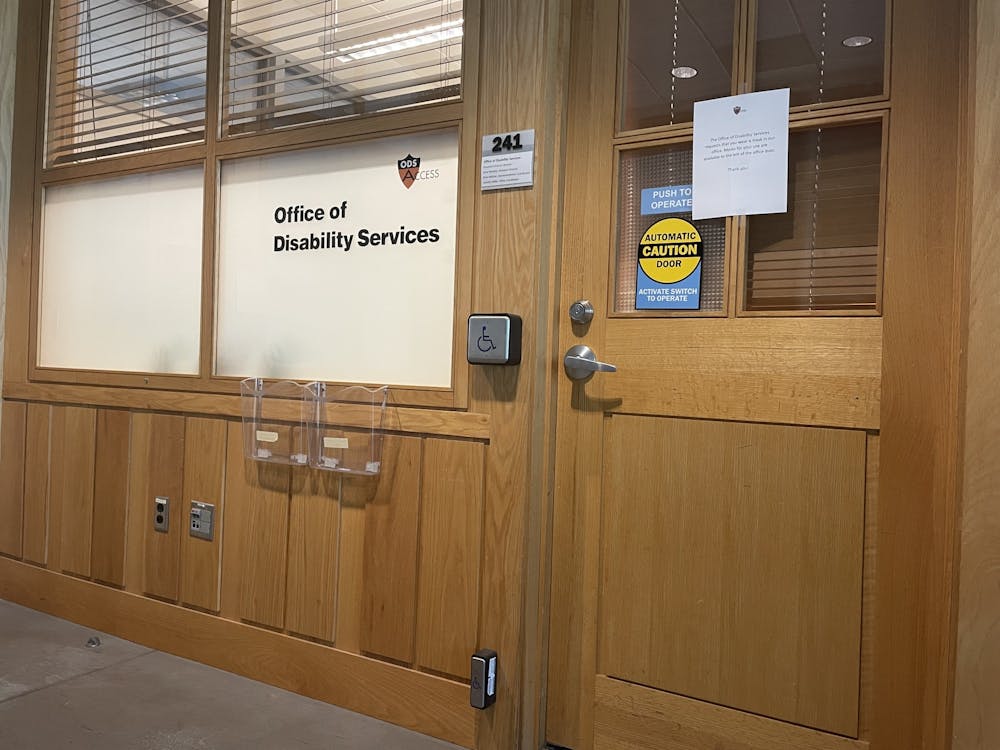As the end of the spring semester nears, Director of Campus Accessibility Michael Barnes’ first year of working at Princeton is coming to a conclusion — as is the first year of the position’s existence, which was introduced by the University this fall. Barnes’ role is intended to serve as the “leading authority on physical accessibility on campus,” according to a listing posted to DiverseJobs in September 2022. Barnes identifies as a person with a non-physical disability.
“As a student with a disability, I relied heavily on my university's disability support office and credit this experience with my career trajectory,” he wrote in a message to The Daily Princetonian.
His hiring comes at a time of extensive disruption to physical accessibility on campus, with 11 major ongoing construction projects termed “one of the most extensive building programs in [University] history.” These projects have been criticized by members of the University community for reducing campus accessibility and impairing physical access. Detours are often unideal for those with mobility-related disabilities, due to narrow walkways, steep inclines, or stairs.
The Director of Campus Disability’s responsibilities include supporting the work of previously established positions and offices, such as the University’s ADA/Section 504 Coordinator, the Office of Disability Services (ODS), and Facilities, as well as identifying new initiatives to enhance access on campus.
ADA refers to The Americans with Disabilities Act, a law that prohibits discrimination against individuals with disabilities in many areas of public life. Section 504 is a portion of the Rehabilitation Act of 1973 that prohibits discrimination on the basis of disability in programs that receive federal financial assistance from the U.S. Department of Education.
When asked about what projects he has taken on so far, Barnes reported that he has “had many conversations,” but noted that “there are more perspectives needed.”
“From the beginning, we saw this role as being one that, while based in Facilities, has substantial ties to the Vice Provost for Space Programming and Planning, Institutional Equity and Diversity, and the Office of Disability Services, among others,” he wrote. “It was important to establish these relationships from the beginning.”
Liz Erickson, the Director for Disability Services and the AccessAbility Center, confirmed that she has collaborated “frequently” with Barnes in the past few months. She noted that his presence has offset work relating to “physical access challenges” that was previously under ODS purview.

“[H]aving the authority to lead efforts for change will be instrumental in increasing the pace at which we maintain and make improvements to physical access,” Erickson added.
According to University Spokesperson Michael Hotchkiss, “[Barnes’] focus in his first four months has been on learning about the campus, connecting with members of the Princeton community, and meeting with stakeholders on specific accessibility concerns.”
Erickson said that the Director of Campus Accessibility position is “novel in the field of higher education” and “will enable Princeton to be on the leading edge of advancement of physical access on our campus.”
All members of the Ivy League offer support for accessibility at the administrative level, generally through directors of institutional equity, student disability services, or ADA/504 coordinators. Princeton is the first to have a full-time staff member dedicated to issues of physical access.

According to Hotchkiss, a team of campus stakeholders conducted a nationwide search to fill the new position, created in an effort to fulfill an institutional commitment to “creating a wholly accessible and welcoming campus for all.”
“Fulfilling this vision required a leader who would be responsible for assessing and addressing the accessibility needs of our facilities, grounds, paths and parking.”
In a statement sent to the ‘Prince,’ Barnes said that he “knew coming in that a lot of exceptional work around accessibility was already happening,” raising examples of progress prior to his arrival, such as the installation of an elevator in Nassau Hall and the design of Yeh College and New College West.
He clarified, however, that the work is not done.
“There are accessibility challenges across campus,” Barnes wrote. “By acknowledging the challenges and keeping them in front of mind, Princeton will become a more accessible place every semester.”
Prior to signing on at Princeton, Barnes was a faculty member in Stockton University’s program in Disability Studies. He has additionally served as director of several disability resource centers, at various colleges and universities throughout his career. He graduated from Cabrini University with a Bachelor of Arts in Education and Bachelor of Science in Special Education in 2006 and received a Master of Science in Education Degree from the University of Pennsylvania in 2011.
Tess Weinreich is an associate News editor for the ‘Prince.’
Please direct any corrections requests to corrections[at]dailyprincetonian.com.
Correction: a previous version of this article misidentified Barnes’ disability.








